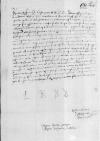List #2533
Magnus HARALDI do Ioannes DANTISCUSRostock, 1542-02-03
Regest polski: Prosi o pomoc w uzyskaniu beneficjum dla Piotra Braska – kuzyna zmarłego na wygnaniu w Polsce biskupa Linköping Hansa Braska
| odebrano Guttstadt (Dobre Miasto), 1542-05-30 Rękopiśmienne podstawy źródłowe:
Pomocnicze podstawy źródłowe:
Publikacje:
| ||||||||||
Tekst + aparat krytyczny + komentarz Zwykły tekst Tekst + komentarz Tekst + aparat krytyczny
Reverendissimo in Cristo patri et domino domino
Reverendissime in Cristo pater et domine. Cum debita obsequiorum recommendatione. Salutem.
Piae recordationis
Raptim ex
E(iusdem) or E(idem)⌈E(iusdem)E(iusdem) or E(idem)⌉
Reverendissimae
P(aternitatis) or P(aternitati)⌈P(aternitatis)P(aternitatis) or P(aternitati)⌉
Vestrae eadem gratia


 UUB, H. 154, f. 60v
UUB, H. 154, f. 60v